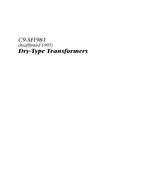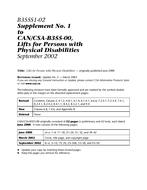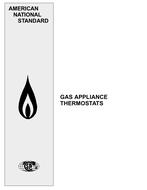Preface
This is the fourth edition of CSA/ANSI NGV 1, Compressed natural gas vehicle (NGV) fuelling connection devices . It supersedes the previous editions published in 2017, 2006, and 1998. The major changes to this edition include a) the addition of HD profiles and a new low-pressure profile for ANG; b) low pressure profile from P12 to P9, as requested by the ANG stakeholders; and c) the room temperature leak test only requiring type 3 nozzles to be tested at 5 psi. This Standard is considered suitable for use for conformity assessment within the stated scope of the Standard. CSA Group acknowledges that the development of this Standard was made possible, in part, by the financial support of Natural Resources Canada. This Standard was prepared by the Subcommittee on Fuelling Connection Devices for Compressed Natural Gas, under the jurisdiction of the Technical Committee on Natural Gas Transportation and the Transportation Strategic Steering Committee, and has been formally approved by the Technical Committee and the Interprovincial/Territorial Gas Advisory Council. This Standard has been developed in compliance with Standards Council of Canada requirements for National Standards of Canada. It has been published as a National Standard of Canada by CSA Group. This Standard has been developed in compliance with the American National Standards Institute (ANSI). Interpretations: The Technical Committee on Natural Gas Transportation has provided the following direction for the interpretation of standards under its jurisdiction: “The literal text shall be used in judging compliance of products with the safety requirements of this Standard. When the literal text cannot be applied to the product, such as for new materials or construction, and when a relevant committee interpretation has not already been published, CSA Group’s procedures for interpretation shall be followed to determine the intended safety principle.”
Scope
1.1 Applicability This Standard applies to newly produced compressed natural gas vehicle (NGV) fuelling connection devices, hereinafter referred to as “devices”, constructed entirely of new, unused parts and materials. NGV fuelling connection devices consist of the following components, as applicable: a) receptacle and protective cap (mounted on vehicle) (see Clause 4.4); b) nozzle (see Clause 4.2); and c) three-way valve (external to nozzle and mounted in the fuel dispenser system) (see Clause 4.5). Note: P36HD nozzles designed in accordance with this Standard will not be compatible with existing P36 heavy duty applications using C200 (ISO 14469) receptacles, equivalent to P30HD (see Figure 6).
1.2 Applicable pressures This Standard applies to devices that have a service pressure of either 6205 kPa (900 psi), 16 500 kPa (2400 psi), 20 700 kPa (3000 psi), or 24 800 kPa (3600 psi), hereinafter referred to in this Standard as the following [see Clause 4.8.3c)]: a) “P9”: 6205 kPa (900 psi); b) “P24”: 16 500 kPa (2400 psi); c) “P30” and “P30HD”: 20 700 kPa (3000 psi); and d) “P36” and “P36HD”: 24 800 kPa (3600 psi). The “HD” suffix designates a larger geometry version to allow higher flow rates associated with fuelling larger heavy duty applications. Legacy connection devices produced prior to the 2017 edition of this Standard used the P30 HD profile only (see Figure 6).
1.3 Mating components This Standard applies to devices with standardized mating components (see Clauses 4.4.6and 4.6).
1.4 Applicable design parameters This Standard applies to devices that a) prevent natural gas vehicles from being fuelled by a dispenser with service pressures higher than the vehicle it was designed for; b) allow natural gas vehicles to be fuelled by a dispenser with service pressures equal to or lower than the vehicle fuel system service pressure; and c) prevent light duty natural gas receptacles from being fuelled by a heavy duty nozzle.
1.5 Exclusions This Standard does not apply to repaired or rebuilt nozzles.
1.6 Pressure references All references to “psi or kPa” throughout this Standard are to be considered gauge pressures unless otherwise specified.
1.7 Units of measure The values given in SI units are the units of record for this Standard. The values given in parentheses are for information and comparison only.
1.8 Terminology In this Standard, “shall” is used to express a requirement, i.e., a provision that the user shall satisfy in order to comply with the Standard; “should” is used to express a recommendation or that which is advised but not required; and “may” is used to express an option or that which is permissible within the limits of the Standard. Notes accompanying clauses do not include requirements or alternative requirements; the purpose of a note accompanying a clause is to separate from the text explanatory or informative material. Notes to tables and figures are considered part of the table or figure and may be written as requirements. Annexes are designated normative (mandatory) or informative (non-mandatory) to define their application.
Product Details
- Edition:
- 4th
- Published:
- 12/14/2022
- ISBN(s):
- 9781488344008
- Number of Pages:
- 75
- File Size:
- 1 file , 1.2 MB
- Product Code(s):
- 2430148, 2430148
- Note:
- This product is unavailable in Russia, Ukraine, Belarus


